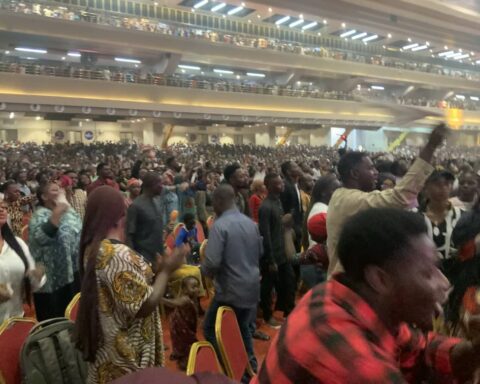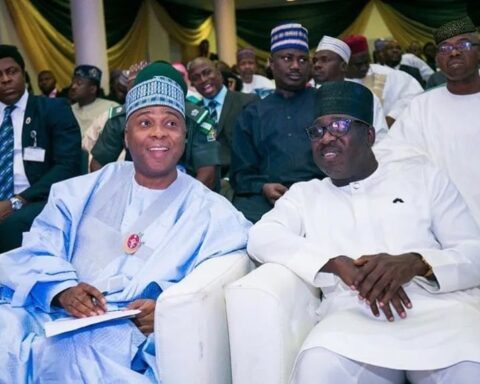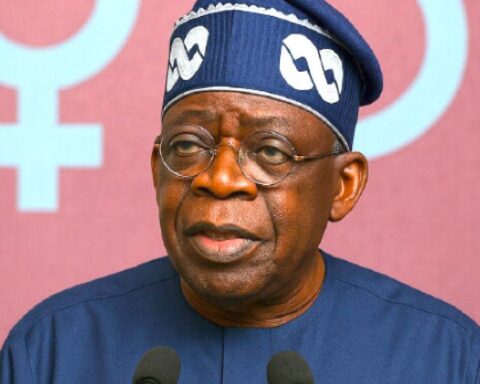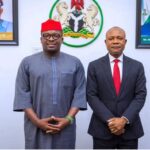By Sonnie Ekwowusi
Pope Francis was, by all standards, a Pope of mercy. Following the teaching of Jesus Christ—exemplified in His eating and drinking with sinners—and in line with Jesus’ dictum, “I have not come to call the righteous but sinners” (Matthew 9:13), Pope Francis, since the beginning of his pontificate, has always opened his arms to welcome and receive sinners and all who sought his company, even to the misunderstanding of some.
Like Jesus Christ, Pope Francis understood that his mission was not to condemn or judge others, but rather to reach out and save others, especially those abandoned in the periphery. I remember that when the Nigerian Catholic lawyers visited the Vatican some years ago, Pope Francis told them and others that, beyond operating in parishes, they should go into the world and bear witness for Christ.
In 2015, Pope Francis declared an Extraordinary Jubilee Year of Mercy, calling on people to embrace God’s mercy and be more merciful toward others. He has consistently reached out to marginalized groups—such as refugees, the poor, the vulnerable, prisoners, and people with disabilities. He has emphasized that the Church should focus on those on the periphery of society rather than the powerful or elite. This is seen as an act of mercy, as he believes the Church’s mission is to heal and support the suffering.
Pope Francis’ message of mercy, love, forgiveness, a non-judgmental stance, and compassion for sinners underscores the importance of humility, the recognition of one’s own sinfulness, and the need for God’s grace and mercy.
Amid high-level terrorism, suicide bombings, wars, rumors of a Third World War, and human tragedies afflicting humanity and threatening international peace, several Popes have constructed an ethical framework for human solidarity in finding solutions to the absence of peace in the world.
For example, shortly after the First World War in 1919, President Woodrow Wilson was received at the Vatican by Pope Benedict XV to foster peace in the world. President Eisenhower visited Pope John XXIII in Rome to discuss world peace. In his epic Encyclical *Pacem in Terris*, Pope John XXIII established four pillars upon which peace should be built.
Remember President Bush’s meeting with Pope Emeritus Benedict XVI to promote peace in the world? With 104 trips outside Italy (including 16 trips to the African continent), St. John Paul II the Great was outstanding for his tenacity in promoting peace, tolerance, commitment to social justice, respect for human dignity, and inter-religious dialogue.
On October 6, 1979, President Jimmy Carter had the pleasure of hosting the first White House visit by a Pope when St. John Paul II visited the United States, advocating for peace in the world. In fact, St. John Paul II acted directly as an intermediary in the promotion of justice and peace in countries where peace was threatened.
Recall that on December 15, 1982, St. John Paul II had
an audience with Yasser Arafat on the peaceful settlement of the Palestinian question. Not to mention his famous meeting with King Hassan II on August 19, 1995, which was attended by well over 80,000 youths, or his visits to Ghana, Kenya, Senegal, Cameroon, and Nigeria.
In fact, his visit to Nigeria during the reign of dictator Sani Abacha remains indelibly engraved in the minds of many Nigerians—if not for anything else, for the fact that the Pope called for peace in Nigeria.
Therefore, following in the footsteps of his predecessors in the Papacy, Pope Francis had throughout his Papacy doggedly committed himself to the promotion of international peace throughout the duration of his pontificate. He has advocated for the abolition of nuclear weapons, stressing that their existence is an “immoral” threat to humanity. He has urged world leaders to invest in peace rather than in arms, warning against the destructive power of modern weaponry. Pope Francis has also been a vocal critic of the arms trade, which he believes fuels conflicts around the world.
Lest we forget, Pope Francis played a key role in the peace process between the Colombian government and the Revolutionary Armed Forces of Colombia (FARC). In 2017, he met with both sides in an effort to broker reconciliation and peace after years of violent conflict. Pope Francis has consistently advocated for peace in the Middle East, emphasizing that the spilling of human blood in Gaza is a slur on our human existence. He has called for a two-state solution, stressing the rights of both the Israeli and Palestinian peoples to live in peace and security.
On June 8, 2014, Pope Francis hosted Israeli President Shimon Peres, Palestinian President Mahmoud Abbas, and Ecumenical Patriarch Bartholomaios in the Vatican Gardens to explore new ways of building peace in Jerusalem and reconciling seemingly irreconcilable foes.
At that historic meeting, the participants acknowledged that despite the failure of previous efforts by world leaders to resolve the Israeli-Palestinian and broader Middle East crises, renewed and greater efforts must be made to broker peace in the region.
In his address, Pope Francis—whom President Peres described as “a bridge builder of brotherhood and peace”—stated that while human ingenuity is essential in resolving the Middle East crisis, peacemakers must also begin to rely on the help of God. He stressed the urgency of the moment, noting that children weary and worn out by the conflict are now pleading with leaders “to tear down the walls of enmity and to set out on the path of dialogue and peace, so that love and friendship will prevail.”
In his emotional and poetic response, President Peres said, “The tears of mothers over their children are still etched in our hearts. We must put an end to the cries, to the violence, to the conflict. We all need peace—peace between equals. Your invitation to us to join you in this momentous ceremony to call for peace, here in the Vatican Garden, in the presence of Jewish, Christian, Muslim, and Druze leaders, graciously reflects your vision of the aspiration we all share.”
Pained by the seemingly unending war and the continued spilling of human blood in South Sudan, Pope Francis, in 2019, organized a retreat for South Sudanese leaders and their warring opposition groups at the Vatican. It was a two-day retreat—what Cardinal Parolin called a “spiritual, ecumenical, and diplomatic” initiative.
Among the preachers at the retreat were Archbishop John Baptist Odama of Gulu, Uganda, and Nigerian Jesuit priest Father Agbonkhianmeghe Orobator. Other notable attendees included the spiritual leader of the Anglican Communion worldwide, Archbishop Justin Welby, members of the South Sudan Council of Churches, and other Catholic and Presbyterian church leaders from across Africa.
At the end of the retreat, Pope Francis addressed the attendees in Italian, saying: “There will be struggles and disagreements among you, but keep them within you—inside the office, so to speak. But in front of the people, hold hands, united. So, as simple citizens, you will become fathers of the nation… I am asking you as a brother to stay in peace. I am asking you with my heart: let us go forward. There will be many problems, but they will not overcome us. Resolve your problems.”
Therefore, following in the footsteps of his predecessors in the Papacy, Pope Francis has doggedly committed himself to the promotion of international peace throughout the duration of his papacy. He has advocated for the abolition of nuclear weapons, stressing that their existence is an “immoral” threat to humanity. He has urged world leaders to invest in peace rather than arms, warning against the destructive power of modern weaponry. He has also been a vocal critic of the arms trade, which he believes fuels conflicts around the world.
Lest we forget, Pope Francis played a key role in the peace process between the Colombian government and the Revolutionary Armed Forces of Colombia (FARC). In 2017, he met with both parties in an effort to broker reconciliation and peace after years of violent conflict. He has consistently advocated for peace in the Middle East, emphasizing that the spilling of human blood in Gaza is a stain on our shared humanity. He has called for a two-state solution, upholding the rights of both Israelis and Palestinians to live in peace and security.
On June 8, 2014, Pope Francis hosted Israeli President Shimon Peres, Palestinian President Mahmoud Abbas, and Ecumenical Patriarch Bartholomaios in the Vatican Gardens to explore new avenues for peace in Jerusalem and reconciliation between seemingly irreconcilable foes. During this historic meeting, the leaders agreed that although previous efforts to resolve the Israeli-Palestinian and broader Middle East crises had borne little fruit, renewed and intensified efforts were necessary.
In his address, Pope Francis—described by President Peres as “a bridge builder of brotherhood and peace”—stated that in addition to human effort, peacemakers must rely on divine assistance. He underscored the urgency of resolving the crisis, noting that children, weary and worn out by prolonged conflict, are now pleading with leaders “to tear down the walls of enmity and to set out on the path of dialogue and peace, so that love and friendship will prevail.”
In his emotional and poetic response, President Peres said, “The tears of mothers over their children are still etched in our hearts. We must put an end to the cries, the violence, the conflict. We all need peace—peace between equals. Your invitation to us to join you in this momentous ceremony to call for peace, here in the Vatican Garden, in the presence of Jewish, Christian, Muslim, and Druze leaders, graciously reflects your vision of the aspiration we all share.”
Pained by the seemingly unending war and bloodshed in South Sudan, Pope Francis, in 2019, organized a retreat for South Sudanese leaders, including members of the opposition and rebel groups, at the Vatican. This two-day retreat—described by Cardinal Parolin as a “spiritual, ecumenical, and diplomatic” initiative—was attended by various Christian leaders, including Archbishop John Baptist Odama of Gulu, Uganda, Nigerian Jesuit priest Father Agbonkhianmeghe Orobator, Anglican Archbishop Justin Welby, and members of the South Sudan Council of Churches.
At the close of the retreat, Pope Francis addressed the leaders in Italian: “There will be struggles and disagreements among you, but keep them within you—inside the office, so to speak. In front of the people, hold hands, united. As simple citizens, you will become fathers of the nation… I am asking you as a brother to stay in peace. I am asking you with my heart: let us go forward. There will be many problems, but they will not overcome us. Resolve your problems.”
Thereafter, Pope Francis did something dramatic. Clad in his white cassock and zucchetto, he stooped low—flattening himself on the ground—and kissed the feet of the South Sudanese leaders and their opponents.
Though they were wearing shoes, the Pope humbly kissed their dusty footwear. With this profound gesture, he appealed to them to lay down their arms and allow peace to reign in South Sudan. Many visitors and onlookers were deeply moved by the Pope’s extraordinary humility.
It is clear that if mankind is to pursue peace, now more than ever, we must rediscover the path that leads to genuine reconciliation, concord, and unity. It is not enough to wax philosophical on the vexing matter of global peace. World leaders must identify common values as the foundation for a new international order grounded in justice, service, mutual respect, and human dignity.
For peace to reign in the world, warring factions must learn to forgive one another. Peace begins in the heart. As Josemaría Escrivá wrote, “It is useless to call for external calm if there is no calm in men’s consciences.”
Therefore, peace is born from a purified heart. It is nurtured in sacrifice. It is sustained by justice.
Building on the Church’s ecumenical dialogue with Muslims, Pope Francis established strong relations with Muslim leaders. A milestone was his 2019 visit to the United Arab Emirates, where he signed the Document on Human Fraternity with the Grand Imam of Al-Azhar. The document emphasized cooperation between Christians and Muslims to foster peace, tolerance, and mutual respect.
Age upon age, wrote Emmet John Hughes on October 20, 1958, the city of Rome “has affected the destiny and trial of the Church in profound and ever new ways. No matter who sits on the throne of St. Peter in Rome,” continued Hughes, “he can know but one heritage, one purpose and, in G.K. Chesterton’s words, ‘one scheme…bestriding lands and ages with gigantic arches, and carrying everywhere the high river of baptism upon an aqueduct of Rome.’”
These prophetic words find fulfillment in Pope Francis’ recent declaration, *Dignitas Infinita* (“Infinite Dignity”), released on April 8, 2024. This 20-page document unequivocally denounces, among other things, LGBT ideology, surrogacy, and gender ideology as grave violations of human dignity and transgressions against God’s teaching and divine plan for humanity. Citing the prophet Isaiah—”Woe to those who call evil good and good evil, who put darkness for light and light for darkness”—Dignitas Infinita bluntly criticizes these practices. It affirms the Church’s longstanding position that the human person is a unity of body and soul, and that “the dignity of the body cannot be considered inferior to that of the person as such.”
This reiterates the Church’s established doctrine, previously outlined in the 2008 document *Dignitas Personae* and in *Donum Vitae* some twenty years prior, which condemned artificial reproduction, surrogacy, and experimentation on human embryos as violations of human dignity and offenses against God.
In an age when many define their worth by the size of their cars, houses, or wealth, Pope Francis’ austere lifestyle and detachment from materialism are striking. He has deliberately renounced the comfort and luxury often associated with high office, modeling his life on Jesus Christ, who said: “If any man wishes to come after me, let him deny himself, and take up his cross daily and follow me. For he who would save his life will lose it; but he who loses his life for my sake will save it. For what does it profit a man, if he gains the whole world, but ruins or loses his soul?”
During his visit to America, Pope Francis famously chose to ride in a modest black Fiat 500L, rather than a limousine. Flanked by other vehicles, his humble choice of transportation stood as a powerful symbol of simplicity and servant leadership—one that, to many, was deeply edifying.
In Washington D.C., Pope Francis made a clear and compelling case for American founding principles as understood and exemplified by President Abraham Lincoln, civil rights icon Martin Luther King Jr., Catholic Worker Movement founder Dorothy Day, and Cistercian monk Thomas Merton. He presented these figures as enduring sources of hope and as bulwarks of American democracy.
Addressing a joint session of the American Congress (Pope Francis is the first pope ever to address a joint session of the U.S. Congress), he reminded the senators and representatives that politics is not the first thing; rather, politics is an expression of the deeper values within humanity. Therefore, politics should not be perceived as a mere instrument for promoting secular progressivism at the expense of the lofty values that reside in the human heart.
But the crowning moment of Pope Francis’ visit to America, in my humble view, was his speech at the General Assembly of the United Nations. The Pope began by reflecting on the lofty ideals that led to the founding of the United Nations as the successor to the League of Nations. He praised the great achievements of the UN, as it turned 70, in promoting peace, human fraternity, and the advancement of human rights.
However, he expressed regret that the misuse of political power and environmental degradation has left many people marginalized. As a solution, Pope Francis advocated for inclusive politics and responsible environmental stewardship that benefits all—economically, socially, politically, and spiritually. He emphasized that integral human development is rooted in three material and spiritual goods: housing; dignified and properly remunerated employment; adequate food and drinking water; religious freedom; and, more broadly, spiritual freedom and education.
“These pillars of integral human development have a common foundation,” said Pope Francis, “which is the right to life and, more generally, what we could call the right to the existence of human nature itself.”
I believe Pope Francis will also be most remembered as a Pope of hope. He has proclaimed the year 2025 as a Jubilee Year—a special holy year of grace and pilgrimage in the Church—with the theme “Pilgrims of Hope.” This Jubilee is officially titled *Spes Non Confundit* (Hope Does Not Disappoint). Its theme is a profound reminder that all of us on earth are wayfarers and pilgrims journeying toward a definitive Home.
Pope Francis passed away in April, during the Octave of Easter, probably the time he wanted to died Yesterday, it was very difficult for him to perform the Urbi et Orbi blessing at St. Peter’s Basilica. I watched him—tired and barely able to lift his hands. It is noteworthy that St. Pope John Paul II also died in April, around the Easter season.
In the death of Pope Francis, the world has lost not just a peacemaker and a bridge builder, but a spiritual father—a universal shepherd who was always ready to provide his flock with their due of spiritual nourishment at the opportune time.
Sonnie Ekwowusi is a Member of the Editorial Board of The Guardian Newspaper
Follow us on all social media platforms @dailyquery for news around the globe.



























